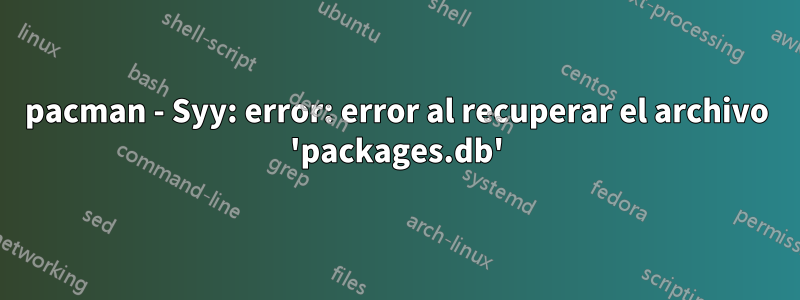
Ejecuto un contenedor Manjaro dentro de una máquina AWS Cloud9 con docker container run --interactive --tty manjarolinux/build bashy el primer comando que ejecuto pacman -Syyfalla con el siguiente resultado:
# pacman -Syy
:: Synchronizing package databases...
error: failed retrieving file 'packages.db' from disk : Couldn't open file /build/packages/packages.db
error: failed to update packages (download library error)
core 167.5 KiB 722 KiB/s 00:00 [#####################################################################################] 100%
extra 1986.5 KiB 2.37 MiB/s 00:01 [#####################################################################################] 100%
community 5.8 MiB 3.10 MiB/s 00:02 [#####################################################################################] 100%
multilib 192.6 KiB 0.00 B/s 00:00 [#####################################################################################] 100%
error: failed to synchronize all databases
/build/El directorio está vacío, por lo que ese archivo no existe. ¿Cuál es el propósito de ese archivo? ¿Y cómo debería solucionar este problema?
Necesito instalar paquetes en el contenedor, pero pacman parece inútil en este momento.
/etc/pacman.conf:
#
# /etc/pacman.conf
#
# See the pacman.conf(5) manpage for option and repository directives
#
# GENERAL OPTIONS
#
[options]
# The following paths are commented out with their default values listed.
# If you wish to use different paths, uncomment and update the paths.
#RootDir = /
#DBPath = /var/lib/pacman/
#CacheDir = /var/cache/pacman/pkg/
#LogFile = /var/log/pacman.log
#GPGDir = /etc/pacman.d/gnupg/
#HookDir = /etc/pacman.d/hooks/
HoldPkg = pacman glibc manjaro-system
# If upgrades are available for these packages they will be asked for first
SyncFirst = manjaro-system archlinux-keyring manjaro-keyring
#XferCommand = /usr/bin/curl -L -C - -f -o %o %u
#XferCommand = /usr/bin/wget --passive-ftp -c -O %o %u
#CleanMethod = KeepInstalled
Architecture = auto
# Pacman won't upgrade packages listed in IgnorePkg and members of IgnoreGroup
#IgnorePkg =
#IgnoreGroup =
#NoUpgrade =
#NoExtract =
# Misc options
#UseSyslog
#Color
#TotalDownload
CheckSpace
#VerbosePkgLists
# By default, pacman accepts packages signed by keys that its local keyring
# trusts (see pacman-key and its man page), as well as unsigned packages.
SigLevel = Required DatabaseOptional
LocalFileSigLevel = Optional
#RemoteFileSigLevel = Required
# NOTE: You must run `pacman-key --init` before first using pacman; the local
# keyring can then be populated with the keys of all official Manjaro Linux
# packagers with `pacman-key --populate archlinux manjaro`.
#
# REPOSITORIES
# - can be defined here or included from another file
# - pacman will search repositories in the order defined here
# - local/custom mirrors can be added here or in separate files
# - repositories listed first will take precedence when packages
# have identical names, regardless of version number
# - URLs will have $repo replaced by the name of the current repo
# - URLs will have $arch replaced by the name of the architecture
#
# Repository entries are of the format:
# [repo-name]
# Server = ServerName
# Include = IncludePath
#
# The header [repo-name] is crucial - it must be present and
# uncommented to enable the repo.
#
[packages]
SigLevel = Optional TrustAll
Server = file:///build/packages
[core]
Include = /etc/pacman.d/mirrorlist
[extra]
Include = /etc/pacman.d/mirrorlist
[community]
Include = /etc/pacman.d/mirrorlist
# If you want to run 32 bit applications on your x86_64 system,
# enable the multilib repositories as required here.
[multilib]
Include = /etc/pacman.d/mirrorlist
# An example of a custom package repository. See the pacman manpage for
# tips on creating your own repositories.
#[custom]
#SigLevel = Optional TrustAll
#Server = file:///home/custompkgs
Respuesta1
Comente la línea 3 sobre los repositorios personalizados.
[packages]
SigLevel = Optional TrustAll
Server = file:///build/packages
Si nunca lo modificaste. No sé por qué se configuran los repositorios personalizados. pero ciertamente no usas tus propios repositorios. Por lo tanto, los repositorios personalizados deben comentarse.


